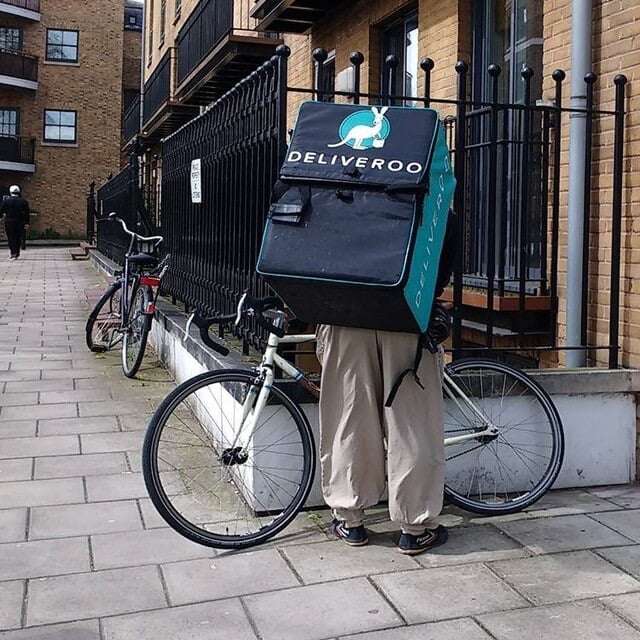The Home Office will share the locations of hotels housing asylum seekers with food delivery companies as part of a crackdown on illegal working, enabling firms to identify accounts that spend significant time near these premises. The new agreement with Deliveroo, Just Eat and Uber Eats aims to prevent delivery riders from sharing their accounts with migrants who lack the right to work in the UK.
Under the new measures announced on Wednesday, delivery companies will receive information about asylum hotel locations to help them detect patterns of misuse and quickly suspend fraudulent accounts. The move comes after reports emerged of asylum seekers earning up to £1,000 per week through “sub-letting” delivery rider accounts, despite being barred from employment during their first 12 months in the UK.
Home Secretary Yvette Cooper said: “Illegal working undermines honest business, exploits vulnerable individuals and fuels organised immigration crime. By enhancing our data sharing with delivery companies, we are taking decisive action to close loopholes and increase enforcement.”
The Home Office revealed that recent enforcement action by the food delivery firms had already led to thousands of people being removed from their platforms. Last month, the companies met with ministers and committed to implementing enhanced security measures, including increased facial verification checks and fraud detection tools.
Asylum seekers are prohibited from working whilst their claims are being processed, though they can apply for permission after waiting for a year. However, concerns have been raised about migrants in taxpayer-funded hotels circumventing these restrictions by using legitimate workers’ accounts in exchange for weekly fees ranging from £75 to £100.
All three delivery platforms have pledged their commitment to the new measures. A Deliveroo spokesperson said: “Deliveroo has led the sector in introducing security measures to prevent the abuse of our platform and tackle the sophisticated criminals seeking new ways to exploit all delivery platforms’ systems. We are fully committed to working with the government as we continue to collectively combat illegal working.”
Just Eat stated: “We continue to invest significant resources to strengthen our systems against abuse by individuals and organised criminal groups seeking to evade right-to-work rules.” Uber Eats added: “We have introduced a range of state-of-the-art detection tools to find and remove fraudulent accounts. We are constantly reviewing our tools and finding new ways to detect and take action on people who are trying to work illegally.”
The announcement coincides with the government unveiling wide-ranging sanctions targeting people-smuggling networks. Foreign Secretary David Lammy released a list of 25 individuals and entities being sanctioned, including a small boat supplier in Asia, gang leaders based in the Balkans and North Africa, and middlemen facilitating illicit payments through informal Hawala banking systems.
“From Europe to Asia we are taking the fight to the people-smugglers who enable irregular migration, targeting them wherever they are in the world and making them pay for their actions,” Mr Lammy said. “My message to the gangs who callously risk vulnerable lives for profit is this: we know who you are, and we will work with our partners around the world to hold you to account.”
The Foreign Secretary described the sanctions as a “landmark moment” in the government’s efforts to tackle organised immigration crime, though he acknowledged they were not a “silver bullet” for solving the Channel migrant crisis.
However, migration experts have questioned the likely effectiveness of both measures. Dr Madeleine Sumption, director of Oxford University’s Migration Observatory, said she would be “surprised” if the sanctions were the “game changer” to end small boat crossings. Speaking to BBC Radio 4’s Today programme, she said: “There are so many people involved in the industry that targeting people individually is probably only going to have an impact around the margins.
Immigration lawyer Emma Brooksbank from Freeths expressed scepticism about the asylum hotel data-sharing arrangement, stating: “It will not be difficult for illegal workers to bypass this restriction and avoid detection, thereby making the agreed data sharing pointless.” She added that gig economy companies have “no real incentive to clean up their act” as the usual right-to-work penalties of £60,000 per illegal worker do not apply to them.
The measures come as the government faces pressure over rising Channel crossings. More than 23,500 migrants have arrived in the UK via small boats so far in 2025, a record for this point in the year and a nearly 50% increase compared to the same period in 2024.
Shadow Home Secretary Chris Philp had previously claimed to have found evidence of people working illegally for food delivery firms during a visit to a hotel housing asylum seekers. Reports have also emerged of asylum hotel kitchens being used to operate secret fast food businesses on delivery platforms, with one case in Wakefield leading to immediate closure following a Home Office investigation.
The Home Office currently houses over 32,000 asylum seekers in hotels, with another 66,000 in private accommodation. The three companies providing asylum accommodation – Mears Group, Clearsprings and Serco – collectively receive £5 million daily from the government on asylum housing contracts.
Minister for Border Security and Asylum, Dame Angela Eagle, recently acknowledged that government controls over these contracts and their subcontractors were “quite weak,” highlighting the challenges facing authorities in managing the asylum accommodation system.
The new measures form part of the government’s broader “Plan for Change” aimed at strengthening border security and tackling illegal migration. However, critics argue that enforcement alone will not address the underlying issues driving irregular migration to the UK.
Follow for more updates on Britannia Daily
Image Credit:
A Deliveroo cyclist in London, UK – Photo by Edwardx, licensed under CC BY-SA 4.0, via Wikimedia Commons.



